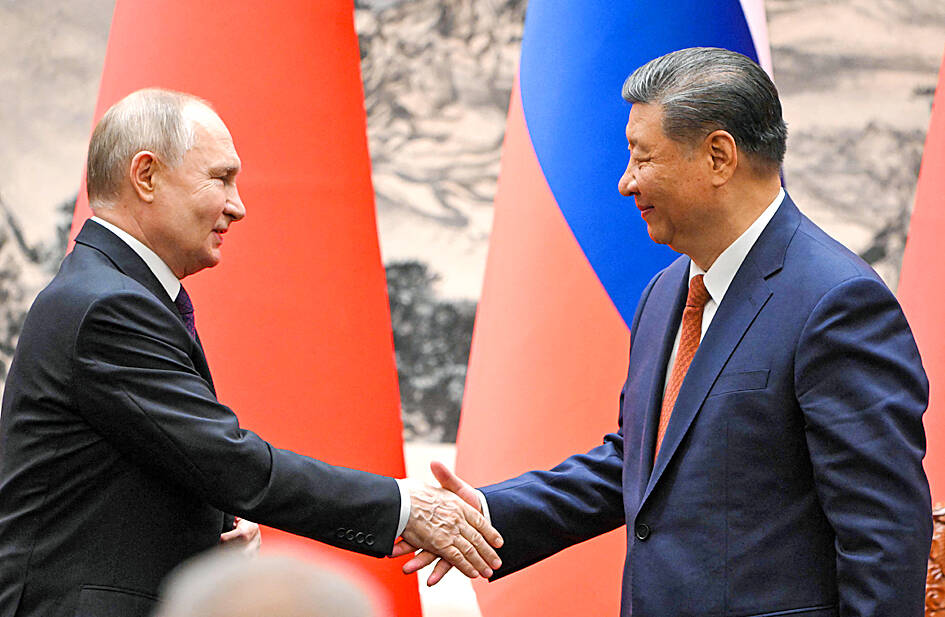Chinese President Xi Jinping (習近平) and Russian President Vladimir Putin yesterday framed their nations’ ties as a stabilizing force in a chaotic world as they met in Beijing.
Putin was greeted by Xi at a grand welcoming ceremony outside Beijing’s Great Hall of the People, footage by state broadcaster CCTV showed.
In a meeting, Xi then told his “old friend” Putin that China-Russia relations were “conducive to peace.”

Photo: AFP
“China is ready to work with Russia to ... uphold fairness and justice in the world,” Xi added.
Putin, in turn, told Xi that the two countries’ relations were “stabilizing factors in the international arena.”
“Relations between Russia and China are not opportunistic and not directed against anyone,” Putin said, a Kremlin readout showed. “Together, we uphold the principles of justice and a democratic world order that reflects multipolar realities and is based on international law.”
Following closed-door meetings, the two leaders signed a joint statement on deepening their countries’ “comprehensive strategic partnership,” Xinhua news agency reported.
The Russian leader’s arrival came hours after he hailed his country’s troops for advancing on “all fronts” on the battlefield in Ukraine, following a major new ground assault.
The Kremlin said that Russia and China had agreed to oppose “further escalation” of the conflict in Ukraine.
“The parties note the need to stop any steps that contribute to the prolongation of hostilities,” the Kremlin’s readout of their joint statement said.
In a statement to media following talks with Putin, Xi said the two sides agreed on the need for a “political solution” to resolve the war.
“China’s position on this issue has always been clear,” Xi said in footage broadcast by Russian TV.
That position included “respecting the sovereignty and territorial integrity of all countries” as well as “respecting the reasonable security concerns of all sides,” he added.
The remarks echo a paper issued by Beijing last year, which Western countries said could enable Russia to hold much of the territory it has seized in Ukraine.

The Ministry of the Interior (MOI) is to tighten rules for candidates running for public office, requiring them to declare that they do not hold a Chinese household registration or passport, and that they possess no other foreign citizenship. The requirement was set out in a draft amendment to the Enforcement Rules of the Public Officials Election and Recall Act (公職人員選舉罷免法 ) released by the ministry on Thursday. Under the proposal, candidates would need to make the declaration when submitting their registration forms, which would be published in the official election bulletin. The move follows the removal of several elected officials who were

The Republic of China (ROC) is celebrating its 114th Double Ten National Day today, featuring military parades and a variety of performances and speeches in front of the Presidential Office in Taipei. The Taiwan Taiko Association opened the celebrations with a 100-drummer performance, including young percussionists. As per tradition, an air force Mirage 2000 fighter jet flew over the Presidential Office as a part of the performance. The Honor Guards of the ROC and its marching band also heralded in a military parade. Students from Taichung's Shin Min High School then followed with a colorful performance using floral imagery to represent Taiwan's alternate name

FOUR DESIGNATED AREAS: Notices were issued for live-fire exercises in waters south and northwest of Penghu, northeast of Keelung and west of Kaohsiung, they said The military is planning three major annual exercises across the army, navy and air force this month, with the navy’s “Hai Chiang” (海強, “Sea Strong”) drills running from today through Thursday, the Ministry of National Defense said yesterday. The Hai Chiang exercise, which is to take place in waters surrounding Taiwan, would feature P-3C Orion maritime patrol aircraft and S-70C anti-submarine helicopters, the ministry said, adding that the drills aim to bolster the nation’s offshore defensive capabilities. China has intensified military and psychological pressure against Taiwan, repeatedly sending warplanes and vessels into areas near the nation’s air defense identification zone and across

A Chinese takeover of Taiwan would severely threaten the national security of the US, Japan, the Philippines and other nations, while global economic losses could reach US$10 trillion, National Security Council Deputy Secretary-General Lin Fei-fan (林飛帆) wrote in an article published yesterday in Foreign Affairs. “The future of Taiwan is not merely a regional concern; it is a test of whether the international order can withstand the pressure of authoritarian expansionism,” Lin wrote in the article titled “Taiwan’s Plan for Peace Through Strength — How Investments in Resilience Can Deter Beijing.” Chinese President Xi Jinping’s (習近平) intent to take Taiwan by force